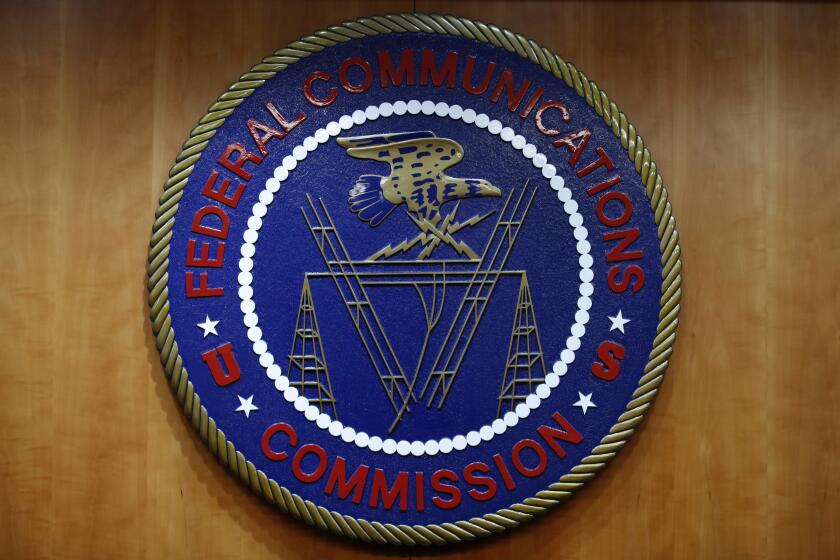Federal court decision won’t change California net neutrality law

- Share via
Despite the dismantling of the Federal Communications Commission’s efforts to regulate broadband internet service, state laws in California, New York and elsewhere remain intact.
This week’s decision by the 6th U.S. Circuit Court of Appeals, striking down the FCC’s open internet rules, has little bearing on state laws enacted during the years-long tug-of-war over the government’s power to regulate internet service providers, telecommunications experts said.
In fact, some suggested that the Cincinnati-based 6th Circuit’s decision — along with other rulings and the U.S. Supreme Court’s posture on a separate New York case — has effectively fortified state regulators’ efforts to fill the gap.
“Absent an act of Congress, the FCC has virtually no role in broadband any more,” Ernesto Falcon, a program manager for the California Public Utilities Commission, said in an interview. “The result of this decision is that states like California, New York and others will have to govern and regulate broadband carriers on our own.”
California has one of the nation’s strongest laws on net neutrality, the principle that internet traffic must be treated equally to ensure a free and open network. Former Gov. Jerry Brown signed the measure into law in 2018, months after federal regulators in President elect-Donald Trump’s first administration repealed the net neutrality rules put in place under President Obama.
Colorado, Oregon and other states also adopted their own standards.
A federal appeals court in Ohio ruled that the Federal Communications Commission lacked authority to reinstate open internet rules.
The Golden State’s law has already survived legal challenges. It also prompted changes in the way internet service providers offered plans and services.
“California’s net neutrality law, which is seen as the gold standard by consumer advocates, carries national impact,” Falcon said.
Known as the California Internet Consumer Protection and Net Neutrality Act (formerly California Senate Bill 822), the law blocks what the state views as anti-competitive practices that harm consumers.
Such measures include slowing or throttling traffic speeds by internet providers. It also bans some forms of “zero rating,” an industry term for when a company exempts a select service from data caps.
After California’s law went into effect, telecommunications giant AT&T ended its practice of providing the Max streaming service to its phone customers without counting usage against a customer’s data cap. Streams of other services — those not owned by AT&T — were counted against the cap. The practice was seen as a way to keep consumers tethered to their AT&T phones.
The first Trump administration sued to block California’s law, delaying it for several years.
But after President Biden took office in 2021, his administration dropped efforts to defang California’s law.
A federal appeals court has upheld California’s net neutrality law, rejecting an attempt by telecommunications industry groups to prevent the state from enforcing it.
An industry trade group, representing broadband providers, took up the cause. The group, ACA Connects, sued California Atty. Gen. Rob Bonta, seeking a preliminary injunction to prevent the law from taking effect.
But the courts turned back that legal effort, and the California-based 9th U.S. Circuit Court of Appeals upheld the state law three years ago.
“The state laws have all been upheld,” said John Bergmayer, legal director of the pro-open internet consumer advocacy group Public Knowledge.
Last April, the FCC sought to reinstate the Obama-era rules to provide a national standard.
The FCC was seeking increased oversight so it could step in to force internet providers respond to service outages or security breaches. The FCC also cited national security interests, saying greater scrutiny was needed to enable the commission to effectively crack down on foreign-owned companies deemed security threats.
But three 6th Circuit judges ruled unanimously on Thursday that the FCC went beyond its authority when it tried to reclassify broadband service as a “telecommunications” service that was subjected to increased federal regulation under the 1934 Communications Act and the 1996 Telecommunications Act.
The ruling did not address state net neutrality laws.
Blair Levin, a former top FCC official and policy advisor to New Street Research, said the “the new decision keeps open the door to state action.”
In addition, Levin said the 9th Circuit determined that FCC measures did not preempt states from separately taking action.
He and other legal experts also pointed out the U.S. Supreme Court’s refusal to hear a challenge to a New York law that requires internet service providers to offer low-income broadband service at a speed and price set by the state.
Because the high court skipped that case, the New York law stands. That could invite additional state actions, the analysts said.
“The state’s authority and role in broadband access has grown dramatically now,” Falcon said.
More to Read
Inside the business of entertainment
The Wide Shot brings you news, analysis and insights on everything from streaming wars to production — and what it all means for the future.
You may occasionally receive promotional content from the Los Angeles Times.













